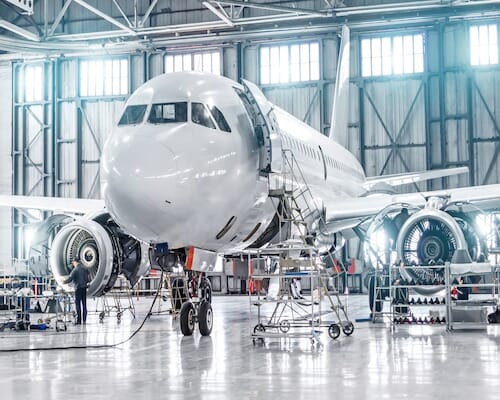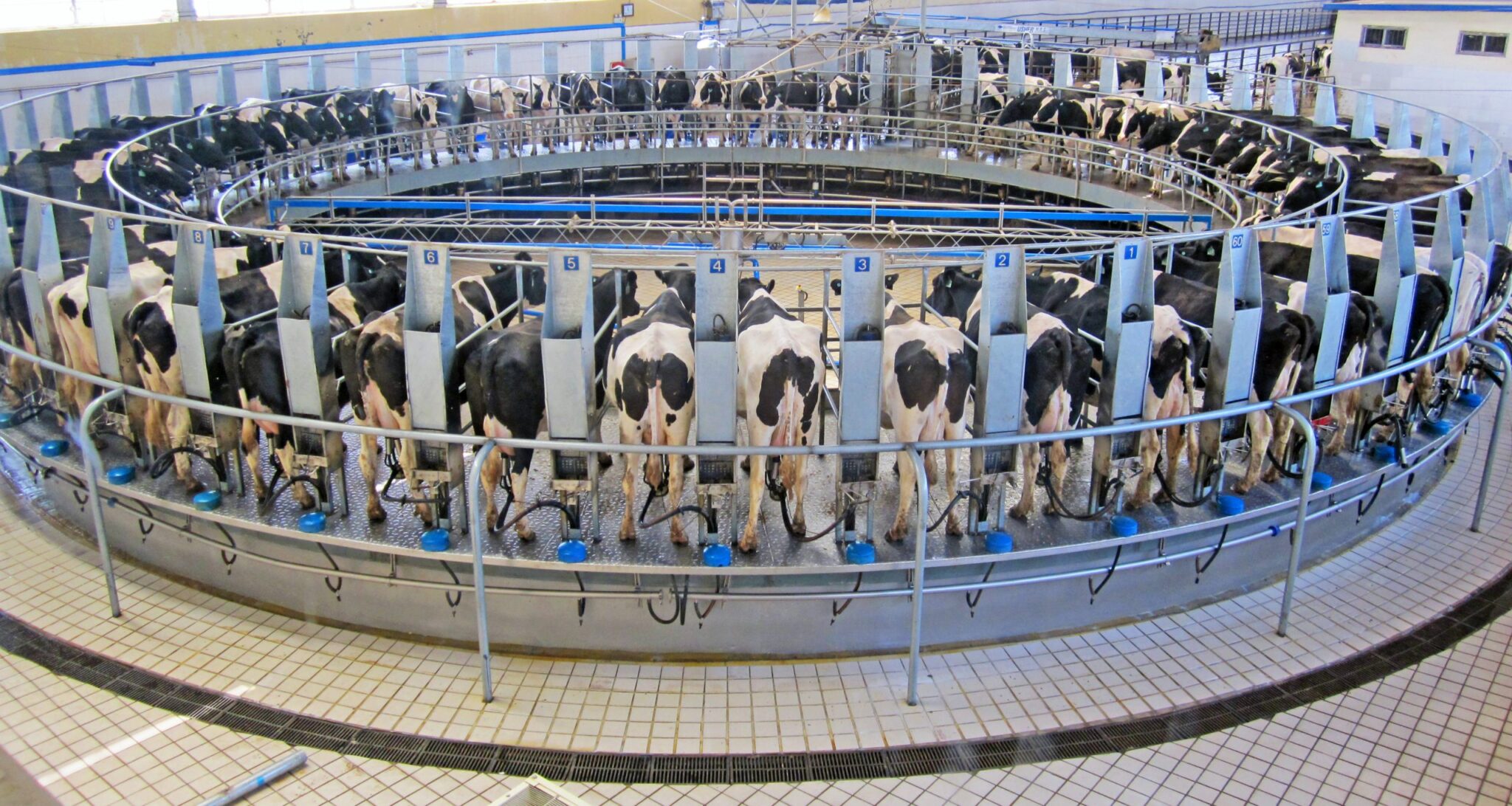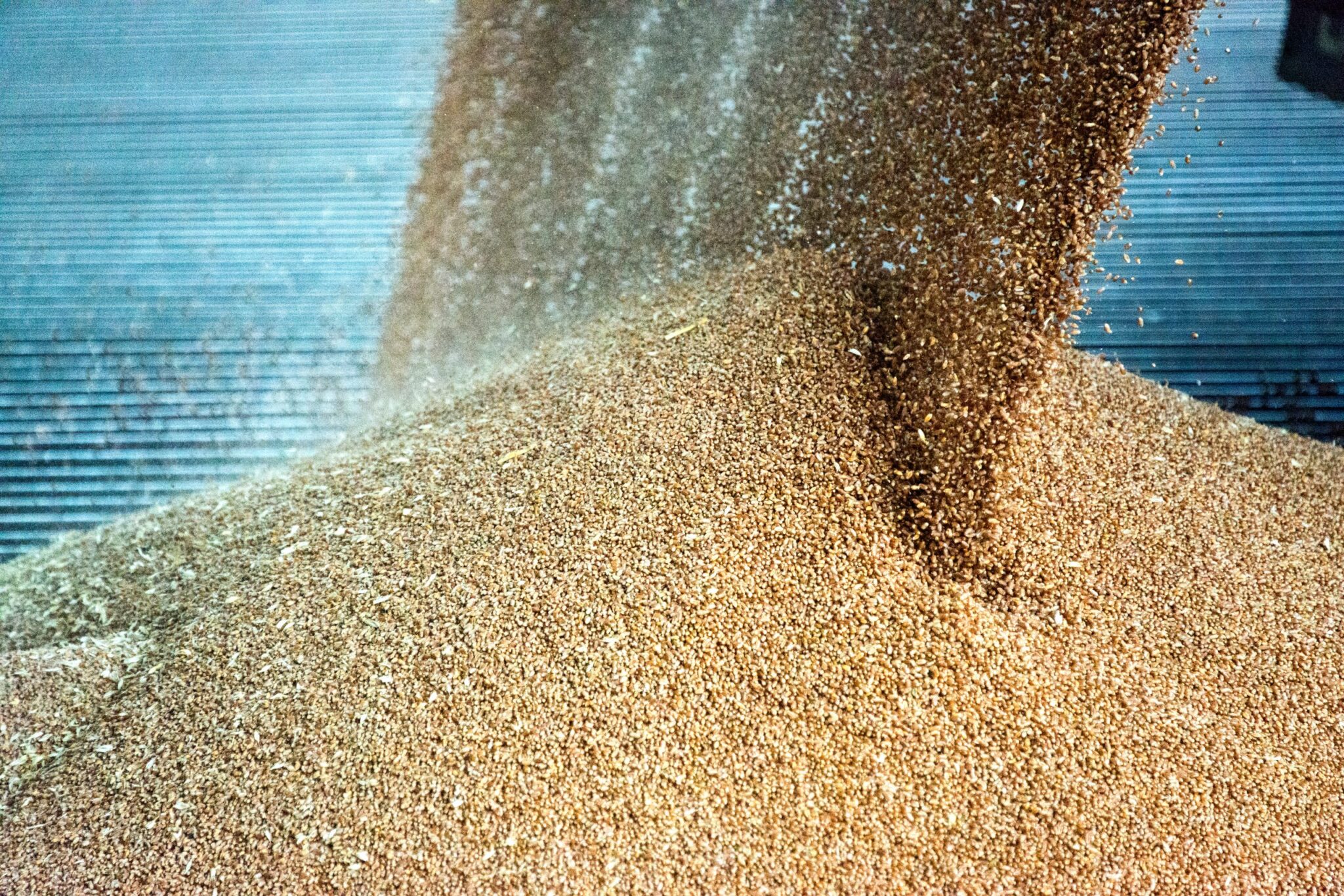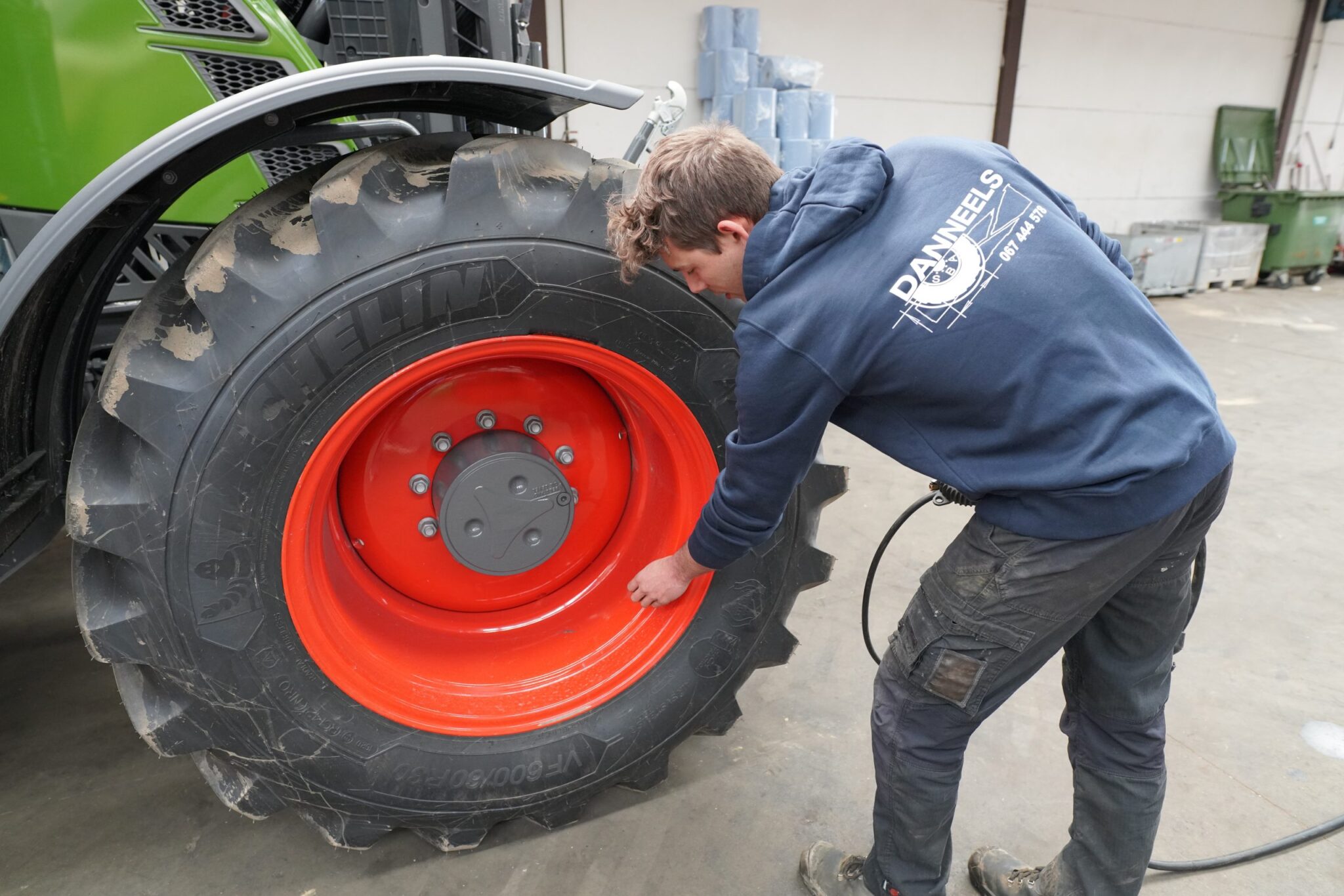
Industrial Vacuum Pumps: Applications and Benefits
February 1, 2023
How Industrial Air Compressors Are Used in the Oil and Gas Industry
February 15, 2023How Industrial Air Compressors Are Used in Agriculture
Kaishan USA | February 8, 2023 | Uncategorized

Air compressor systems helps agricultural producers apply pesticide to their crops.
How Industrial Air Compressors Are Used in Agriculture
Air compressors are used in a variety of applications across the typical agricultural enterprise. They power any number of different kinds of hand tools, from paint sprayers to staplers to nail guns. They inflate tires on everything from personal automobiles to tractors, ATVs, plows, harvesters and more.

Compressed air powers hand tools like nail guns and are used in all kinds of applications around the farm.
Air compressors mounted on vehicles enable the application of pesticides. Plus, pneumatics technology controls the milking robots that increasingly help dairy farmers cut cost and handle larger herds with less manual labor.

Pneumatically driven milking robots help dairy farmers handle a larger herd with fewer people.
You’ll see air-powered materials handling equipment helping to move grain or other materials to silos or other storage areas. And many livestock farmers pump compressed air through wastewater to help break down animal waste.

Air-powered equipment helps store grain and other materials.
Whether they’re in production, moving products or simply cleaning up barns or storage areas, air compressors are down on the farm, helping American agriculture feed millions.
The industry is one of our favorites, and we’ve come to admire the dedication and resourcefulness of agricultural producers nationwide.
Oil-Free Vs. Oil-Lubricated Compressors
That’s why we hate it when our competitors attempt to pressure the nation’s farmers to use oil-free air compressors, even if they’re simply trying to eliminate competitors who are offering oil-lubricated compressors at a much lower price.
We understand the logic. They’re saying that ag producers have to meet food industry standards since their products eventually end up in food.
But we’ve found that traditional oil-lubricated compressors work well in agriculture, too, with proper filtering and use of food-grade lubricants. Our webinar, The Truth About Compressed Air For Manufacturers in the Food and Beverage Industry, has a lengthy discussion on direct vs. incidental food contact.
Oil-free compressors are simply not the only option.
The Pros and Cons of Oil-Free Air Compressors
Oil-free air compressors do have some advantages, of course. In addition to reducing the risk of airborne contaminants, the lack of oil makes routine maintenance a lot easier.
Notice the addition of the word “routine”: oil-free compressors typically need to be rebuilt after five or six years, a major expense as well as a downtime issue. So, while you’re saving money on routine oil changes, you’ll pay all that money back with a rebuild every five years. In addition, oil-free compressors have a lifespan of about 50,000 hours, compared to at least 150,000 for an oil-lubricated compressor.
And the fact that an air compressor is oil-free does not necessarily mean that it is putting out oil-free air. There are many ways oil can get into the final product, especially when the air your compressor takes in contains oil. That can happen if your compressor is in an engine room with other oil-producing equipment or is drawing air from a diesel-driven construction site or major highway.

It’s helpful to have an air compressor when you need to inflate equipment tires.
We’re not against oil-free air compressors. In fact, we’re planning to introduce a new, industry-leading line of innovative, oil-free compressors in the near future. But we believe they should only be used when needed—usually when the compressed air comes in direct contact with food products. And that happens very infrequently down on the farm.
Optimizing Operation of an Oil-Flooded Air Compressor
For most agricultural applications, we recommend oil-flooded rotary screw air compressors because they cost less, run cooler, have tighter tolerances, make more air and are more energy-efficient.
But there are steps you need to take to keep any industrial air compressor working safely and efficiently and complying with regulations.
Food-Grade Lubricants
You can eliminate most of the oil-contamination concern by using food grade lubricants as defined by the U.S. Department of Agriculture:
-
- H1 lubricants, where there is the possibility of incidental food contact
- H2 lubricants, used on equipment and machine parts that do not have any possibility of contact with food
- H3 lubricants, typically edible oils, preventing rust on equipment like hooks and trolleys
Because those distinctions are sometimes tough to make, companies in many industries, not only in agriculture, have played it safe by selecting H1 lubricants.
Testing
You need to commit to air quality testing at least twice a year to make sure there is no oil getting into your compressed air as well. You can install ports to make it easier to capture a sample for testing.
Plus, if you make any changes to your system, even adding to the piping, changing a filter or even doing routine maintenance, you should do another test to make sure you’re still meeting the standards. And it’s important to document those measurements.
Mist Eliminator
We always recommend that our customers add mist eliminators to remove oil mist and water droplets and even slugs from their compressed air flow. A mist eliminator can even prevent contamination if, for some reason, there’s a failure in your separator.
Air Compressor Dryers
Refrigerated dryers cost less to purchase and operate, but desiccant air compressor dryers are the best choice for applications where there will be direct contact with food. Desiccant dryers achieve a dew point as low as -40°F, eliminating the moisture in the air and wiping out bacteria and microorganisms.
Compressed Air Filters
You’ll need good filters to trap particulates and dust particles. Coalescing compressed air filters will catch oil aerosols, water and particulates and activated carbon absorbers will remove any leftover hydrocarbon residue, oils or vapors.
Air Receiver Tanks
You’ll want a wet tank in your compressed air system before the dryers. You typically need one gallon of wet tank capacity for each CFM for your largest compressor. That means that, if you have three compressors, all 500 CFM, you’d want at least a 500 gallon wet air receiver tank.
On the dry side, the rule is three gallons of wet storage per CFM. In our example above, you’ll want a 1,500 gallon dry air receiver tank.
Flow Controller
We recommend that you put a flow controller after the dry tank to help balance the supply of compressed air with the demand side. You can think of it as a shock absorber to buffer peak demands and as a backup. The flow controller kicks on if a main compressor fails, maintaining air flow until your backup air compressor kicks on and gets up to speed.
Hydrocarbon Catalyst
The hydrocarbon catalyst heats the air, breaking down any hydrocarbons and giving you air that meets ISO 8573-1:2010, the standard for Class 0 oil-free air. It also kills off germs, bacteria and viruses.
Aluminum Piping
Over the years, there’s been a migration from traditional steel pipe to aluminum. Because it’s rust-free, it avoids the problems of corrosion and rust that can block air flow. Plus, it’s easy to install, reducing your labor costs.
Monitoring
New developments in networking and communications have made it possible to monitor your air compressor system remotely. At the most basic level, you can get basic alerts, notifying you that your unit is due for service. Or that there is a major problem. And you can set the parameters within any range you choose.
The goal is not to make control changes remotely but to have 24x7x365 visibility into your air compressor system, monitoring all key parameters to give you almost a “continuous audit” of the performance and health of your system. It gives you the opportunity, not only to fix problems, but also to anticipate them and take corrective action before they shut down your air compressor.
The end results? Lower operating costs, less downtime and greater peace of mind. A future-ready solution that also positions you to do troubleshooting, proactive maintenance and performance enhancements.
Kaishan rotary screw air compressors are fully compatible with almost any remote monitoring system. They connect through Modbus, allowing them to work with almost any communications protocol.

Working with an air compressor professional will help you find leaks more quickly and quantify how much you’ll save by fixing them.
Leak Program
Sometimes it’s not hard to find compressed air leaks. The notorious hissing sound gives them away. But 80% of leaks are inaudible. And with the average air compressor system losing 30% to 50% of its volume to leaks, the stakes are high.
We strongly recommend that you have your system inspected on a regular basis by an air compressor system professional who has the most up-to-date equipment and a lot of experience in using it to identify and quantify compressed air leaks. The cost benefits are significant. For more information, see our recent blog post on finding and stopping leaks.
Maintenance
In our experience, agricultural producers who use air compression systems clearly benefit from a comprehensive, coordinated maintenance program hitting the key points: replacing filters (both air-line and oil), clearing drain traps, greasing your compressor’s motor bearings and changing oil. For more information, see our recent blog post on air compressor maintenance.
But many are finding that they no longer have the expertise to deal with the complexities of today’s advanced equipment like air compression systems. It’s another reason we advise producers to seek outside help when problems arise.
Sizing
While some people focus solely on the flow or CFM they need, you also should consider the pressure requirements of the applications you are hoping to service. The best solution is to have a compressor audit or an air audit to help you identify not just the size of the air compressor or compressors you need but also how they are configured in your facility. Find out more about in our blog post, “How to Determine What Size Air Compressor You Need for Industrial Use.”
Consulting Help
As mentioned, most producers need help not only in setting up and selecting the right equipment but also in monitoring and maintaining it for maximum cost- and energy-efficiency.
Kaishan Compressor is fortunate to work with a nationwide network of independent distributors, who can provide on-site help and consultation as needed. These factory-trained air compressor experts have an investment in their local communities and can service your air compressor system without a problem.
Key Takeaways
-
- Air compressors are used in a variety of applications across the typical agricultural enterprise.
- We believe oil-free should only be used as needed—when the compressed air comes in direct contact with food products. And that happens very infrequently down on the farm.
- Compared to oil-free compressors, on average, oil-flooded rotary screw air compressors cost less, run cooler, have tighter tolerances, make more air and are more energy-efficient.
- Taking the right steps with your oil-flooded rotary screw air compressors include assembling the right equipment and following a comprehensive program of monitoring and maintenance.
Let Us Help
We can help you take full advantages of all the benefits an industrial air compressor can provide you as an agricultural producer. Whether you need new equipment, technical services, expert help or just good information, Kaishan and its nationwide network of independent distributors has what you need. Contact us today.
Random stat or
customer quote
textXXtext
text
Air compressors are used in a variety of applications across the typical agricultural enterprise. They power any number of different kinds of hand tools

